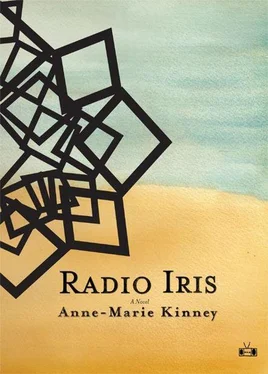“Hmm? What was that?”
“What happens?”
“Well,” he started, “his family is very sad right now. He was too young. But…” he stopped walking now and looked down into her face. “It’s not something you have to worry about, okay?”
“No,” she sighed, exasperated, “I mean what happens until he comes back.”
“What?”
“How long is he dead for? Where does he go?”
“Iris,” he said, crouching down in front of her, holding her small, seemingly boneless arm in his hand. Her father’s eyes searched her face, and she felt exposed, opened against her will. She wanted to hide whatever he was looking for, to bury it within the maze of her guts and nerves. She turned her head toward the ground, a line of ants wending their way out of the patchy grass to her right and onto the dirt path. It struck her then that the ants knew exactly where they were going and what they were doing, always.
“Hey,” he said, gently pulling her face back toward him, “we never… your mom never told you?” He looked worried, his eyes racing across her face.
Iris ran her shoe back and forth in the dirt.
“Honey, people don’t come back after they die.”
“They do…” she murmured.
“No… who told you that?”
“I know they don’t always, but sometimes they… don’t they?” she tried, backtracking. She wished she had never said anything. She couldn’t remember what she’d expected him to say.
“Oh, honey,” he sighed, and the pity in his eyes— she recognized it.
Another gust of wind blew dust into their faces. Her father let go of her arm and coughed, and Iris started running.
The sleepy willow trees, the white sun, the thick cattails and green water— they were all just streaks of color against her low sky. She was running so fast her senses couldn’t keep up. Her whole body was knotted up in her pulsing lungs. When she couldn’t run any further, she slumped down into a patch of grass. She rolled over onto her back and closed her eyes, imagining she was underneath it. She breathed heavily, trying to feel what it would be like to be dead. But she couldn’t feel it. Even with her eyes closed, there were so many things happening. There was warmth, there was the scratching of the dry grass on her arms and the backs of her calves. There was the sound of the wind. There were her own sounds, too— her breath, the sound of her hands clutching at the grass, and always, always some song singing itself in her head— silently humming in spite of her efforts to be still.
She opened her eyes when she felt Sebastian’s tongue on her cheek. Her father and Neil were on their knees on either side of her. Sebastian had been swimming in the lagoon. He dripped the slimy water down her neck as he buried his face behind her ear, like he was going to gobble her whole. She wanted to stay right there for as long as she could, as long as they would let her. She would will time to stop for her. All those dead people, she decided, they just didn’t want it enough.
As her father carried her away, she buried her face into his shoulder and made a promise to herself, to want the world with all her heart. She looked back and saw Neil lagging behind, soberly watching his own shadow extending out across the dirt road, while Sebastian ran up in front of them, leading them all back home.
Sometimes, Iris will forget all about that day for years at a time. When it comes back to her, like heat in her veins, she does not know what to call it. She is mute with desire, and dread.
I’m very busy. Don’t ask. Ask me later. I’m not here.
She runs her fingers over the words, then folds up the napkin and tucks it into a zippered pocket of her purse. She crushes the box and stuffs it into the wastebasket, quickly, instinctively, as though destroying evidence.
Still operating on instinct, her motions swift and mechanical, she pulls a blank sheet of paper out of her desk drawer, uncaps her marker and writes, But you are here. I see you. And it’s later already.
She folds the note into thirds and steps out of the office, but facing 2B, she stops. She wants him to find it, but not to see it coming. She imagines him on the other side of the door, watching as the note slides across the carpet. She imagines him picking it up and dropping it into the trash, unread. She imagines him never even looking down.
She turns and rushes down the stairs, pushes the door open and strides across the parking lot to where the white van sits, the remnants of her fingered outline still lightly etched in the dirt. Standing in the weedy grass behind the curb, facing the van head on, she sees now how hulking it is, how mammoth and forbidding. She lifts one knee up onto the van, then the other, so she is facing the windshield, her palms pressed against the hood, still cold from the long night. She unfolds the note and crawls up closer, pressing it to the glass so it faces the driver’s seat. She fastens it with the windshield wiper, which leaves a gray line down the meat of her hand.
She stays there a moment, on all fours, facing the darkened windshield, the inside blocked off from the outside gaze. He could be in there, she thinks. He could be looking right at me, and I wouldn’t know the difference.
“Hello,” she mouths, looking straight ahead into the opaque window, before hopping down and jogging back to the building. She stops at the door to brush off her dirtied knees and shins.
Days go by. Her boss is gone again; she doesn’t know when he’ll be back. She asks him once, when he calls with instructions to re-type and mail an email he has sent her.
“Do you know what day you’ll be back? By the end of this week, you think?”
“Hard to say, hard to say,” he says, trailing off, “it’s just hard to say at this point…”
This is enough to tell her that— for the time being, she doesn’t have to worry about being caught as she continues to come in early, and to stare out into the hallway, waiting. Sometimes she waits a long time and the man never comes out. She knows he got the note she left on his van— because it’s gone. Unless the wind carried it off. Unless someone else took it. He must come out sometimes— she’s noticed the van’s shifting position in the parking lot. Someone is moving. She wonders if he is well stocked on supplies, if the room is some kind of above-ground bomb shelter. Maybe he is an agoraphobic. It eventually occurs to her that she might hear more if she stations herself at the wall shared by the two offices, behind a sloping, lopsided desk in the storage room. With its musty darkness, and its piles of broken appliances and clutter, it looks as though the bomb has already hit. Iris flicks on the light and squeezes in between an ancient Xerox machine and a dented file cabinet to get to the wall.
She doesn’t know how he got into her office to leave her the note, but despite his stillness, she has come to believe that he is capable of anything. The least he can do now is to make some noise— a snore, a sigh— anything to feed her wonder.
On the days he complies, with the scoot of a chair, a hearty yawn, or a coughing fit, she feels his presence on the other side all day long. Even the sleepy sound of his classical radio is enough. She is typing and she imagines he is combing his hair. She is filing, and he is making a sandwich. While she is standing in front of the fax machine, watching it crank out a sheet of paper in fits and starts, he is doing tai chi, arms outstretched, left foot pointed, toes first, toward the closed window, breathing in the same recycled air. If it weren’t for the wall, they would inhabit the same space, entirely. She wonders if he knows this.
Читать дальше












